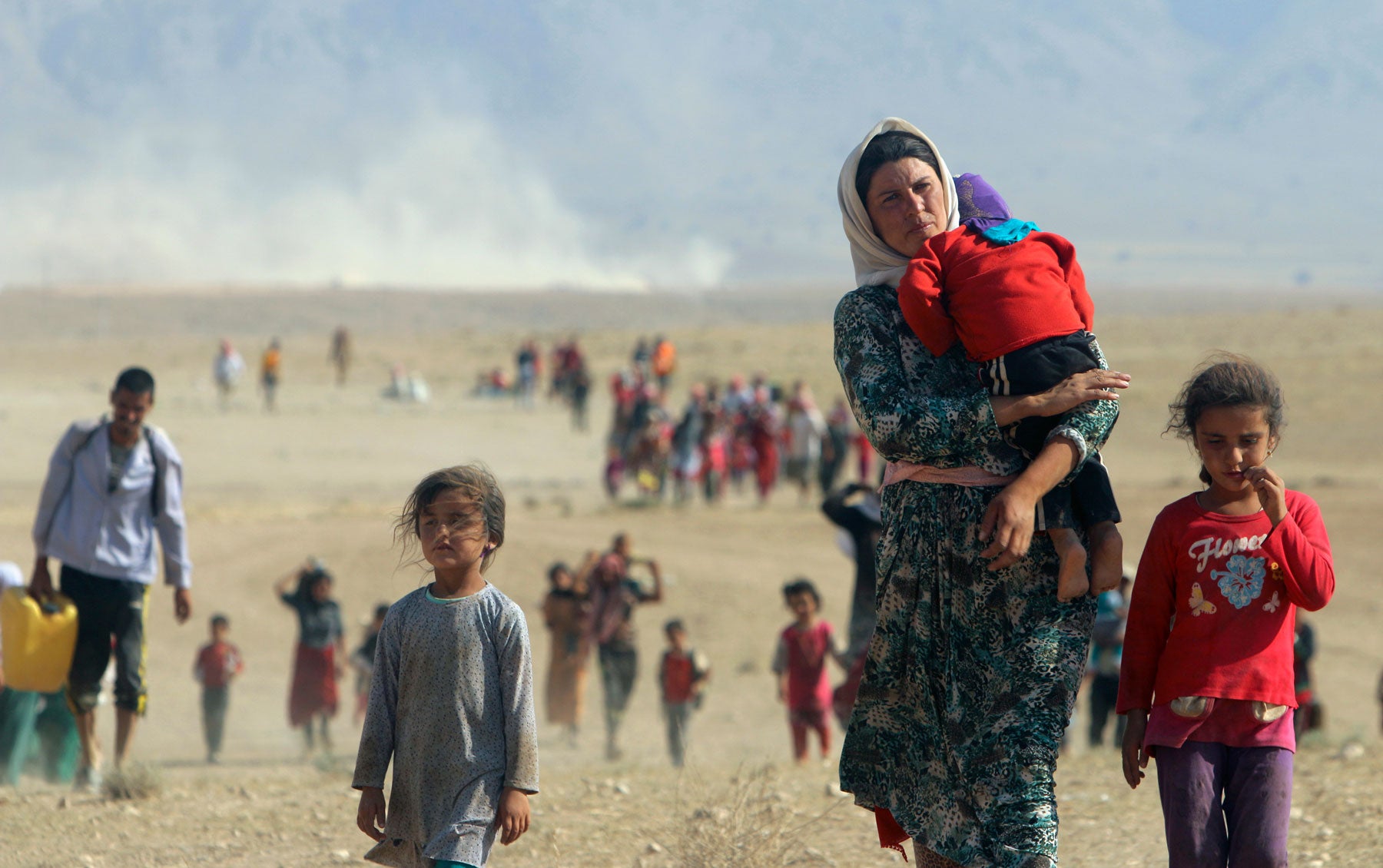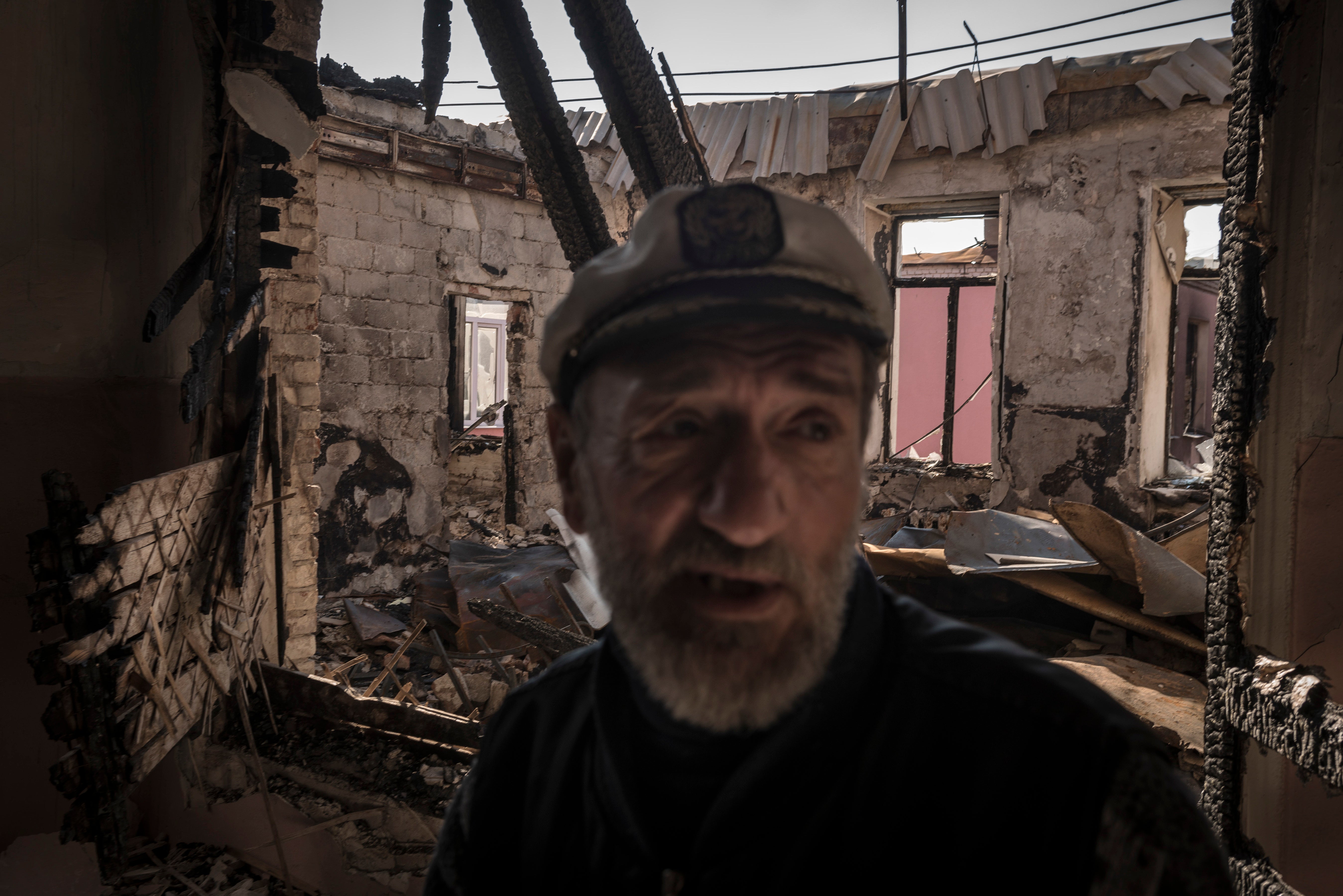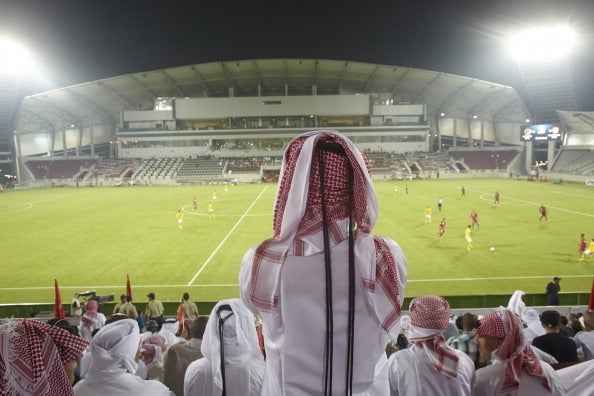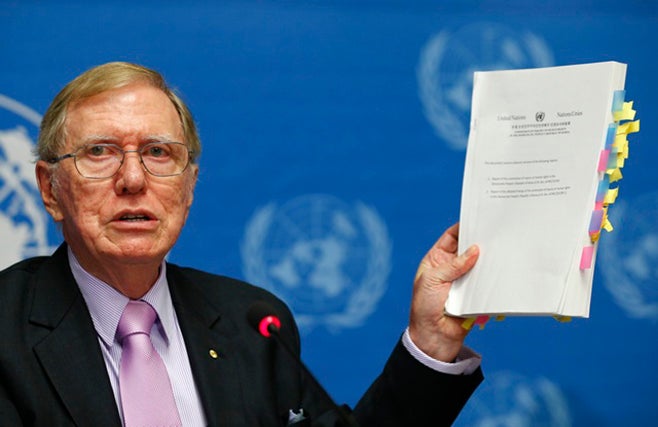Israel and Hamas committed serious violations of the laws of war during fighting in the Gaza Strip in July and August 2014. At least 2,100 Palestinians were killed, of whom the United Nations identified more than 1,500 as civilians, and approximately 11,000 people, mostly civilians, were injured. The tens of thousands of Israeli attacks caused the vast majority of destruction during the fighting, which left uninhabitable 22,000 homes, displacing 108,000 people, and left hundreds of thousands without adequate water or electricity.
Hamas and Palestinian armed groups in Gaza carried out about 1,700 mortar attacks and 4,800 indiscriminate rocket attacks on Israeli population centers during the fighting. The attacks killed five civilians in Israel, wounded thirty-six, and caused thousands of civilians in communities near Gaza to temporarily leave their homes. Israel’s Iron Dome missile defense undoubtedly reduced the possible civilian toll. Sixty-six Israeli soldiers died during the fighting.
Israel and Egypt continued their seven-year blockade of Gaza, which has had a devastating impact on Gaza’s economy, infrastructure, and the free flow of people and goods, particularly exports. In September, Israel agreed to allow more imports to Gaza of goods needed for reconstruction, but severe restrictions on exports and travel remain.
Armed groups in Gaza in August summarily executed at least 25 Palestinians whom they accused of collaborating with Israel. Hamas authorities in Gaza conducted arbitrary arrests and tortured detainees. The authorities permitted some local human rights organizations to operate, but suppressed political dissent, freedom of association, and peaceful assembly.
In 2014, Israeli forces killed 43 Palestinians in the West Bank, including East Jerusalem, as of October 31, including unlawful killings of protesters and others who posed no imminent threat to life. Following the June abduction and killing by Palestinian suspects of three Israeli teenagers, Israeli authorities conducted hundreds of apparently arbitrary arrests and punitively destroyed three family homes.
Israeli authorities demolished hundreds of homes under discriminatory policies and practices, forcibly displacing hundreds of Palestinian residents in the West Bank, including East Jerusalem, as well as Bedouin citizens of Israel. Israeli authorities took inadequate action against Israeli settlers who attacked Palestinians and damaged their property in 307 incidents in 2014 as of December 1, the UN reported. Israel continued to expand unlawful settlements in the occupied West Bank and unlawfully appropriated 400 hectares of land. It also imposed severe restrictions on Palestinians’ right to freedom of movement and arbitrarily detained hundreds of Palestinians, including children and peaceful protesters.
In the West Bank, Palestinian Authority (PA) security services beat peaceful demonstrators, detained and harassed journalists, and arbitrarily detained hundreds. Credible allegations of torture of Palestinians by the PA's security services persisted.
Gaza Strip
Israel
The Israel Defense Forces (IDF) launched an aerial offensive in Gaza on July 8, followed by a ground offensive on July 17. A ceasefire agreement was reached on August 26. The UN has identified 538 children among the 1,563 Palestinian civilians it counted as killed.
Among other unlawful attacks, an Israeli attack on July 9 killed nine civilians, including two boys, who had gathered to watch a televised World Cup game in a beach café. An attack on July 16 killed four boys as they played on Gaza City beach. Attacks striking UN schools serving as shelters for displaced people on July 24 and 30 killed 32 people, including 9 children. An August 3 attacker apparently targeting three Palestinian fighters on a motorbike chose to strike as they were just outside a school housing displaced people killed 9 civilians, including 8 children.
Israeli aerial attacks killed two municipal workers cleaning up war damage in the Bureij refugee camp on July 11. In late July, Israeli ground forces in Khuza`a used civilians as human shields, fired at ambulances, and prevented them from reaching the wounded, and shot and killed fleeing civilians.
Israeli military operations severely damaged or destroyed 28 schools, dozens of wells, two major sewage plants, and electricity and other civil infrastructure, according to the UN. Almost all Gaza residents lost access to running water and electricity for days or weeks.
There has been no real accountability for laws of war violations by either side. The Israeli military opened about 100 probes into attacks by its forces in the 2014 fighting and referred 13 cases for criminal investigations, but the nearly complete absence of criminal prosecutions resulting from self-investigations of alleged war crimes committed in Gaza during the fighting in 2008-2009 and 2012 leaves little reason for expecting a different outcome. Hamas took no steps to prosecute Palestinian combatants for indiscriminate and unlawful rocket and mortar attacks at Israeli population centers in 2014 or for prior similar attacks.
In July, the UN Human Rights Council established a Commission of Inquiry to examine alleged laws-of-war violations by all parties to the July-August fighting. In November, Israel stated it would not cooperate with the Commission, alleging it was biased.
Blockade
Israel's continuing blockade of the Gaza Strip amounted to collective punishment of the civilian population. Egypt also blocked all regular movement of goods at the Rafah crossing, and severely restricted the movement of people through the border. More than 80 percent of Gaza’s 1.8 million people receive humanitarian assistance, and unemployment had reached 45 percent even before the July-August hostilities in which 128 workshops and businesses were destroyed and another 291 damaged.
Even before the 2014 fighting, Israeli imports to Gaza amounted to a mere 15 percent of 2006 levels (before the blockade). Again, even before the fighting, the blockade had caused a shortage of 71,000 homes and 200 schools in Gaza, according to the UN.
Palestinian armed groups used construction materials, almost certainly imported from Egypt, to build tunnels they used to launch attacks in Israel. To prevent military use of concrete and steel bars, Israel and the Palestinian Authority agreed to a monitoring mechanism for imports of the materials. By December, imported materials fell drastically below the levels needed to rebuild civilian homes and infrastructure destroyed during the summer fighting. Israel maintained restrictions on commercial exports from Gaza without a similar security rationale with severe economic consequences.
After taking power in July 2013, Egypt’s military-backed government tightened restrictions on the movement of Palestinians between Gaza and Sinai, cutting the number of Gaza residents passing through the crossing by two-thirds, to an average of 6,444 per month in the first half of 2014. Egypt did not permit regular imports or exports of goods through Rafah. After an October attack by an armed group killed 30 security forces north of the Sinai town of al-Arish, Egypt further restricted border-crossings.
“No-Go” Zones
Before the July-August fighting, Israeli forces continued to shoot at Palestinian civilians in the Israeli-declared “no-go” zone inside Gaza's northern and eastern borders and more than six nautical miles from Gaza’s shore. In the first half of 2014, Israeli forces killed four Palestinian civilians and wounded 87 at distances up to 500 meters inside Gaza, the UN reported.
Following the August 26 ceasefire, Israel eased its restrictions on Palestinian fishermen, allowing them to fish up to six, rather than three, nautical miles from shore. The closures still prohibited access to 70 percent of Gaza's maritime area as recognized under international law. In the first six months of 2014, Israeli naval forces shot at or otherwise used force against fishermen 181 times, and wounded eight, according to the UN.
Hamas and Palestinian Armed Groups
Palestinian armed groups launched more than 5,000 rockets and mortars into Israel, killing 5 civilians, including 370 rockets before the escalation of fighting on July 8, repeatedly forcing civilians in cities throughout Israel to seek protection in shelters. The rockets launched by armed groups in Gaza cannot be accurately aimed at military objectives and amount to indiscriminate or deliberate attacks on civilians when directed at Israeli population centers, in violation of the laws of war.
During the July-August fighting, the UN Relief and Works Agency for Palestine Refugees (UNRWA) discovered that Palestinian armed groups had stored rockets in three vacant schools run by UNWRA. Palestinian fighters endangered civilians by launching rockets from populated areas.
On August 21-23, Palestinian armed groups, most likely acting with Hamas’s approval, summarily executed 25 men in public who were accused of collaborating with Israel. Armed groups took at least 16 of the men from Hamas-controlled prisons.
Hamas took no apparent steps to arrest or prosecute those responsible.
The Internal Security Agency and Hamas police in Gaza tortured or ill-treated 338 people as of October 31, according to complaints received by the Independent Commission for Human Rights (ICHR), a Palestinian rights body.
Hamas security forces arbitrarily detained civil society activists, university professors, and members of the rival Fatah political faction.
West Bank
Israel
Israeli security forces fatally shot at least 43 Palestinian civilians, including 11 children, in the West Bank as of October 31, many in circumstances that suggest the killings were unlawful. In May, Israeli forces killed Nadim Nuwarah, 17, and Muhammad Abu Thahr, 16, during a Palestinian protest near Ofer, an Israeli military base and prison in the West Bank. Videos showed that at the time he was killed neither of the boys was throwing stones or posed any imminent threat to life. In November, Israeli police arrested a Border Police official suspected of killing Nuwarah unlawfully.
Most of the killings occurred after June 11, when the Israeli military undertook operations in response to the abduction and killing of three Israeli teenagers by Palestinian suspects in the West Bank. Israeli forces conducted more than 1,200 raids on homes, offices, and businesses, often destroying personal property, and arrested more than 500 people, many allegedly Hamas supporters. The men were allegedly Hamas members, though there was no public evidence that Hamas ordered the killings; the group praised the abduction but denied responsibility for the teenagers’ murders.
Israeli forces used excessive force responding to protests by Palestinian residents of East Jerusalem after a group of Israelis abducted and burned alive a Palestinian teenager in reprisal for the killing of the three Israeli teens. Undercover Israeli forces arrested and beat unconscious the murdered Palestinian’s cousin, a United States citizen, and later raided his uncle’s home and arrested him and other relatives, without apparent justification. In August, Israeli forces punitively demolished the Hebron-area family homes of three men suspected in the Israeli teens’ killing. In November, Israel punitively demolished the family home of an East Jerusalem man who in October drove his car into a crowded light rail station, killing an infant girl and a 22-year-old woman.
In August, Israeli forces killed three men, including Hashem Abu Maria, who worked with Defense for Children International–Palestine, after a protest in Beit Ummar. None of the men posed an imminent threat to life at the time of their killing.
Israeli authorities failed to take adequate action against Israeli settlers who injured Palestinians and destroyed or damaged Palestinian mosques, homes, schools, cars, and other property. As of October 31, the UN reported 296 such attacks in 2014, including 117 in which Palestinians were injured.
Settlement Building and Discriminatory Home Demolitions
In September, Israel declared 400 hectares of the West Bank “state land,” a move settler leaders praised as paving the way for the construction of a large new settlement in the area. Construction work began on 507 settlement housing units during the first half of 2014, a decrease from the 1,807 begun during the same period in 2013, according to Israel’s Central Bureau of Statistics.
As of December 1, Israeli authorities demolished 552 Palestinian homes and other buildings in the West Bank (including East Jerusalem), displacing 1,170 people. Building permits are difficult or impossible for Palestinians to obtain in East Jerusalem or in the 61 percent of the West Bank under exclusive Israeli control (Area C), whereas a separate planning process readily grants settlers new construction permits in those areas.
Freedom of Movement
Israel maintained onerous restrictions on the movement of Palestinians in the West Bank, including checkpoints and the separation barrier. Settlement-related movement restrictions forced Palestinians to take time-consuming detours and restricted their access to agricultural land.
In one week in May, Israeli forces twice evicted all 62 residents of a Bedouin community, Humsaal-Buqai’a, from their homes to allow “military training” exercises lasting several hours, the UN reported. Israeli forces had displaced residents 14 times since 2012.
Israel continued construction of the separation barrier around East Jerusalem. Some 85 percent of the barrier's route falls within the West Bank rather than along the Green Line marking the pre-1967 border. The barrier separates Palestinian farmers in 150 communities on the eastern side of the barrier from their lands on the western side, the UN reported.
Arbitrary Detention and Detention of Children
Israeli security forces continued to arrest children suspected of criminal offenses, usually stone-throwing, in their homes at night, at gunpoint; question them without a family member or lawyer present; and coerce them to sign confessions in Hebrew, which they do not understand. As of October 31, 163 Palestinian children were in Israeli detention.
As of October 31, Israel held 457 Palestinian administrative detainees without charge or trial, based on secret evidence. Israeli prison authorities shackled hospitalized Palestinians to their hospital beds after they went on long-term hunger strikes to protest their administrative detention.
Palestinian Authority (PA)
Complaints of torture and ill-treatment by West Bank PA security services persisted. The ICHR reported 108 complaints as of October 31.
In April, PA security forces violently dispersed and arbitrarily detained peaceful protesters in Ramallah. The PA continued to ban the distribution of two pro-Hamas weekly newspapers in the West Bank.
Palestinian courts did not find any West Bank security officers responsible for torture, arbitrary detention, or prior cases of unlawful deaths in custody.
Attacks by Palestinian civilians injured 61 Israeli settlers in the West Bank as of October 31, the UN reported. In addition to the three Israeli teenagers who were killed in June, nine Israeli civilians were killed by Palestinians from August to December, including four men and a police officer killed during an attack in a Jerusalem synagogue for which the Abu Ali Mustafa Brigades, a Palestinian armed group, claimed responsibility.
Palestinian governing authorities in the West Bank, as well as in Gaza, delegated jurisdiction over personal status matters such as marriage and divorce to religious courts. In practice, women seeking marriage and divorce suffered discrimination. Courts required Muslim women to obtain a male relative’s consent to marry and to obtain the husband’s consent to divorce except in limited cases.
Israel
Bedouin citizens of Israel who live in “unrecognized” villages suffered discriminatory home demolitions on grounds that their homes were built illegally. Israeli authorities refused to prepare plans for the communities or approve construction permits, and rejected plans submitted by the communities themselves, but retroactively legalized Jewish-owned private farms and planned new Jewish communities in the same areas. The Supreme Court rejected a petition for the state to provide “unrecognized” villages with greater security, such as bomb shelters or coverage by Israel’s “Iron Dome” anti-rocket system, after rockets from Gaza killed a man and severely wounded three children in Bedouin villages in July.
As of June 1, according to the Israeli Bedouin rights group Dukium, Israeli authorities carried out 52 demolitions of Bedouin homes and property, including ploughing up crops and demolishing protest tents in the village of al-Arakib, where residential structures had been destroyed 64 times, as well as the village’s cemetery.
Many of the estimated 200,000 migrant workers in Israel continued to be excluded in practice from rights afforded to other workers, such as paid overtime, under Israel’s Work Hours and Rest Law. From 2008 to 2013, 122 Thai migrant workers in the agricultural sector died in Israel, including 43 from “sudden nocturnal death syndrome,” which affects young and healthy Asian men, and 22 for unknown reasons because police did not request a post-mortem, according to government figures.
Government policies restrict migrant workers from forming families by deporting migrants who marry other migrants while in Israel, or who have children there.
Around 60,000 African migrants and asylum seekers entered Israel irregularly from Egypt since 2005, before Israel completed construction of a fence along its border with Egypt, which prevented any new arrivals in 2014. Israel continued to deny asylum seekers who entered the country irregularly the right to a fair asylum process and detained around 2,500 people, primarily Eritrean and Sudanese nationals. From 2013 through August 2014, some 8,000 Eritreans and Sudanese under indefinite detention or the threat of indefinite detention “chose” to leave Israel.
Israel continued to delegate jurisdiction over marriage, divorce, and some other aspects of personal status to Jewish, Muslim, Christian, and Druze religious courts. In practice, women seeking divorces suffered discrimination, such as refusal of divorce by state-funded Jewish religious courts without the husband’s consent in up to 3,400 cases per year, according to women’s rights groups. The government did not publish data on spouses denied divorce, but women were reportedly the vast majority.
Key International Actors
Palestine ratified core international human rights treaties, the Geneva Conventions, and other treaties in April, following the collapse of US-sponsored peace talks with Israel in the same month. Palestinian President Mahmoud Abbas took no serious steps to obtain the jurisdiction of the International Criminal Court for grave crimes in the West Bank and Gaza. Israel, the US, and European states pressured Abbas not to take such steps. Sweden recognized Palestine as a state in its bilateral relations.
In October, international donors allocated about half of pledges totaling $5.4 billion to humanitarian assistance to Gaza. Economists estimated the damage from the fighting at more than $5 billion.
The US allocated a total of $4.1 billion in military aid to Israel in 2014, including $1 billion in funding for anti-rocket and missile-defense systems, and $440 million in assistance to Palestinian security forces and economic support to the PA.
The EU allocated €130 million ($160 million) in direct financial support to the PA and €450 million ($555 million) in development and security sector support to the Palestinian territory for 2014.
The EU in 2013 signed a memorandum of understanding with Israel that ensured that no EU research and development funding would support Israeli settlement businesses or activities. In 2014, it indicated it would ban some Israeli agricultural imports unless Israel distinguished them from settlement products. Several European government-run pension funds divested from Israeli businesses they deemed to contribute to or benefit from unlawful Israeli practices in occupied Palestinian territory.






